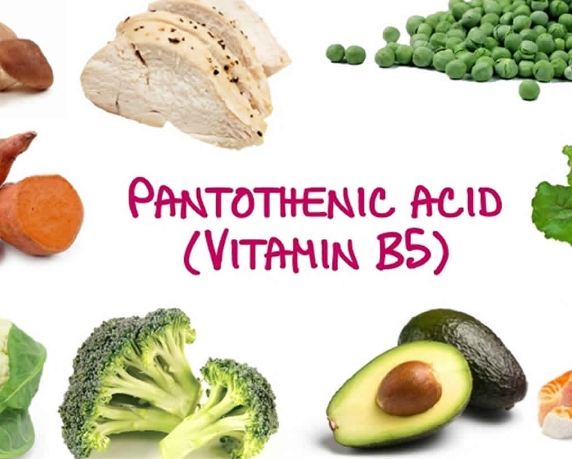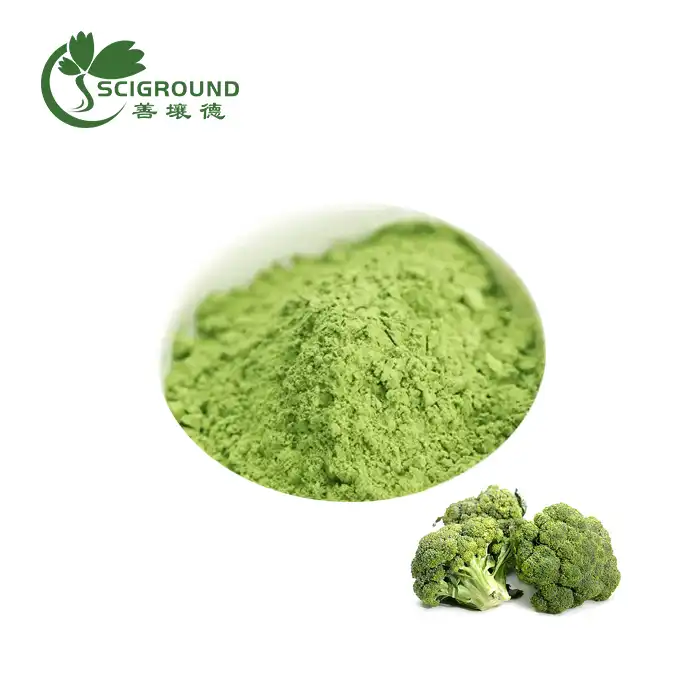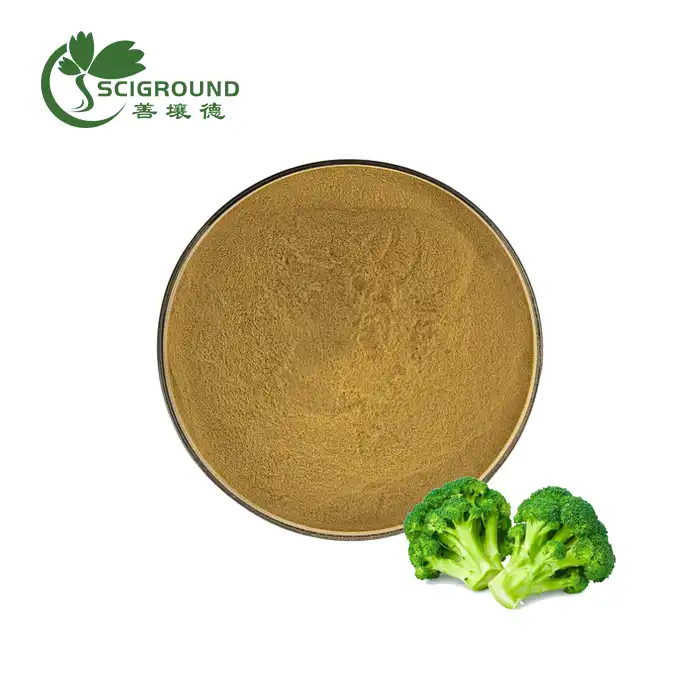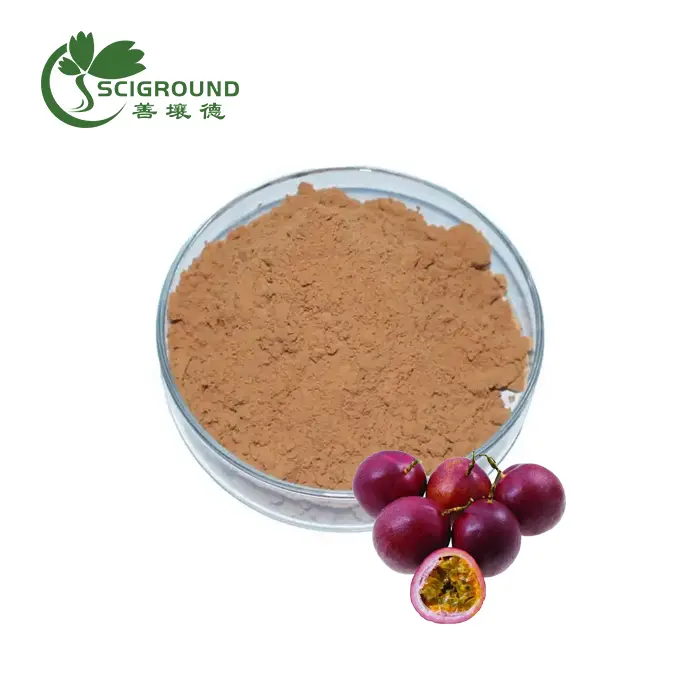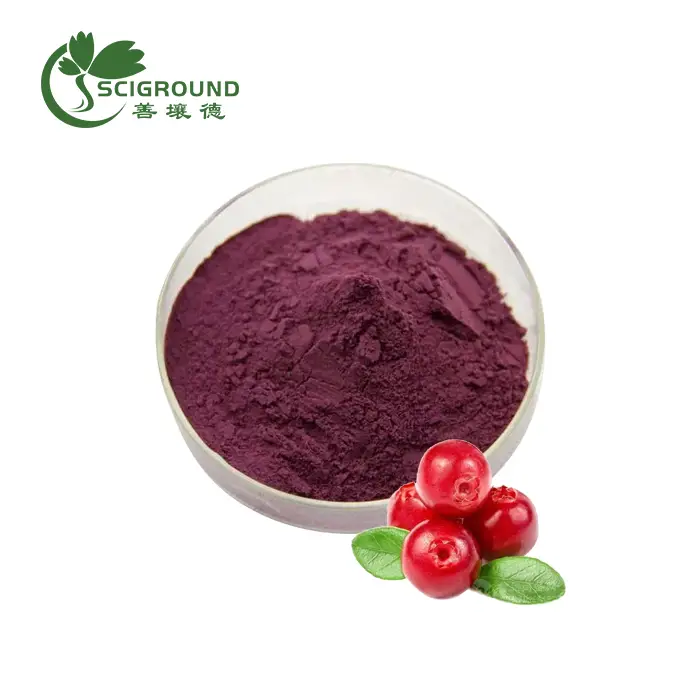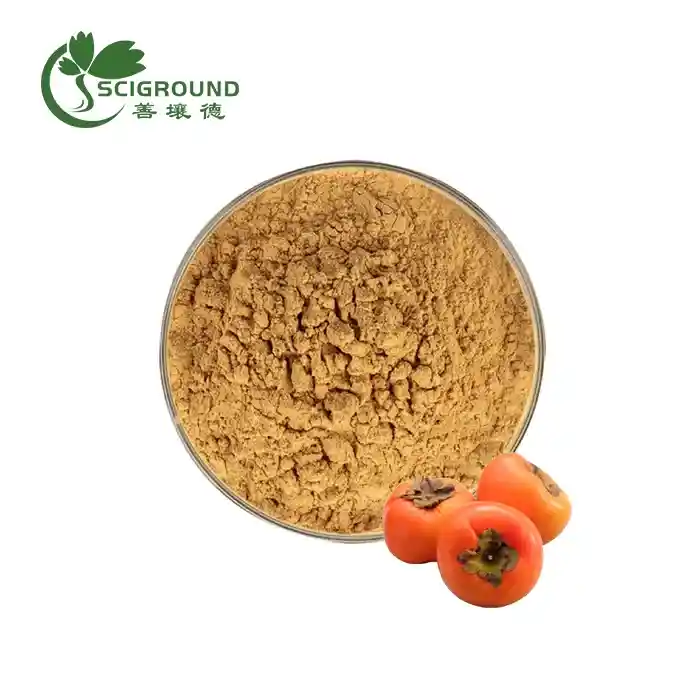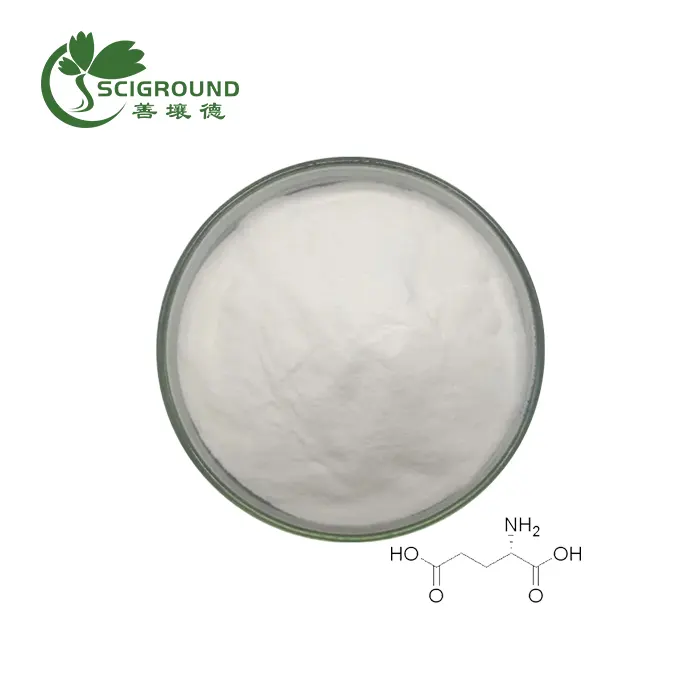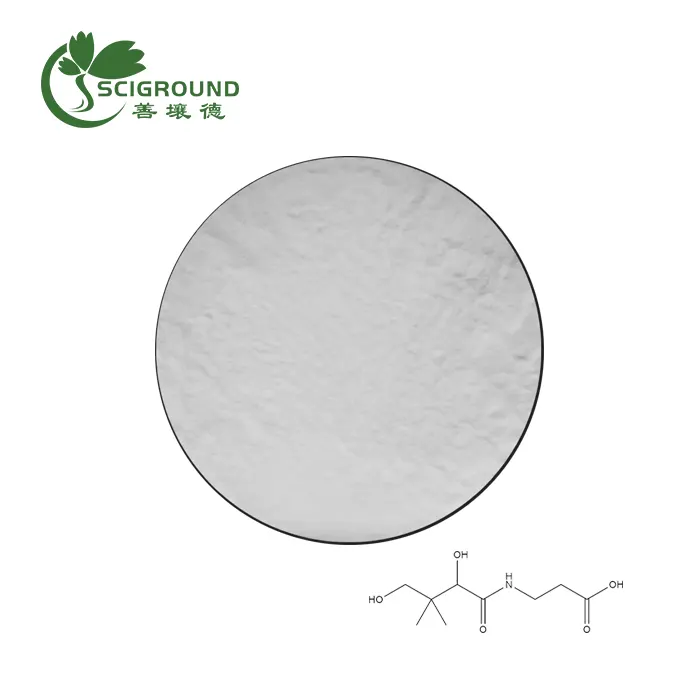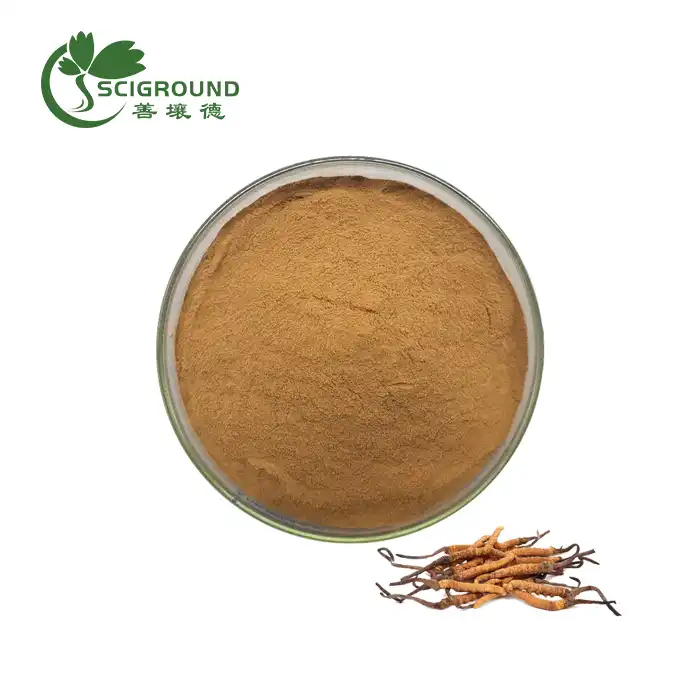What Foods Have Vitamin B5
Foods Highest in Vitamin B5
Many foods contain some amount of vitamin B5, but certain choices offer more substantial amounts. Below are some of the top food sources ranked by milligrams of vitamin b5 powder per standard serving:
Beef, Chicken, and Liver
Meat lovers rejoice, as beef, chicken, and liver—be it from pork, beef, or chicken—provide ample Vitamin B5. These protein-rich foods serve as substantial sources of this essential nutrient, contributing to overall health.
Beef liver – 9.2 mg
Duck liver - 7.6 mg
Chicken liver - 6.4 mg
Pork liver - 5.3 mg
Organ meats like liver offer exceptionally high levels of vitamin B5. However, they are also high in cholesterol so intake should be occasional.
Fish
Trout - 5.4 mg
Salmon - 4.5 mg
Tuna - 4 mg
Fatty fish like salmon and trout are excellent sources of vitamin B5, along with omega-3s, protein, and key minerals.
Peanuts & Sunflower Seeds
Crunchy and flavorful, both peanuts and sunflower seeds pack a punch of Vitamin B5. As convenient snacks or flavorful salad toppers, they offer a healthy dose of this essential nutrient.
Sunflower seeds – 5.2 mg
Pistachios – 1.3 mg
Almonds - 1 mg
Seeds and nuts contain healthy fats, fiber, and vitamin E along with B5. Choose unsalted varieties and limit portions to a handful per day.
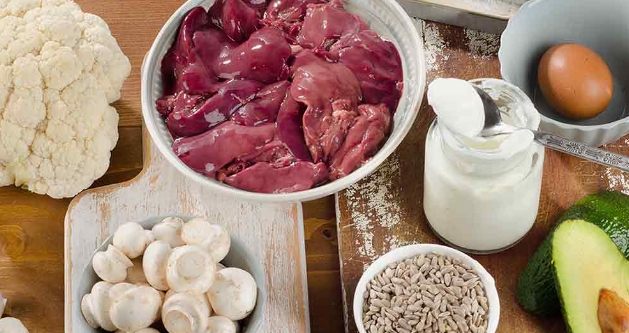
Mushrooms (Shiitake, Agaricus bisporus)
Mushrooms, especially varieties like Shiitake and Agaricus bisporus, bring an earthy flavor to dishes while serving as an excellent source of Vitamin B5. Their versatility in various cuisines makes them a valuable addition to your meals.
Shiitake mushrooms – 5.7 mg
White mushrooms – 1.4 mg
Portobello mushrooms - 1 mg
In addition to being rich in B vitamins, mushrooms offer selenium, potassium, and antioxidants. Sautee them or add to soups, sauces, and salads.
Meats
Ground turkey – 3.7 mg
Lean beef – 2.7 mg
Chicken breast - 2.5 mg
Lean meats provide a hefty dose of vitamin B5 in addition to protein, iron, zinc and other nutrients. Choose grass-fed, organic options when possible.
Whole Grains
Brown rice – 1.2 mg
Oats – 1.1 mg
Whole wheat bread – 0.5 mg
Choose whole grain breads, oats, rice, quinoa, and pasta for fiber and vitamin B5 versus refined options.
Broccoli
1 cup raw – 1 mg
1 cup cooked - 0.6 mg
In addition to vitamin C, vitamin K, and folate, broccoli is one of the richest vegetable sources of vitamin B5.
Avocados
Avocado, a luscious and creamy fruit, isn't just a trendy favorite but also a potent source of Vitamin B5. Beyond its buttery texture and rich taste, it contributes to your daily intake of this essential nutrient, promoting overall well-being.
1 whole avocado – 1.7 mg
1/2 an avocado - 0.9 mg
Creamy, buttery avocados provide nearly 20 vital nutrients like vitamin B5, folate, and potassium.
Milk
A staple in many diets, milk offers more than just calcium. It's a noteworthy source of Vitamin B5, contributing to your daily nutritional needs while enhancing the creaminess of your morning cereal or coffee.
Dairy Foods
Milk - 0.9 mg
Yogurt - 0.4 mg
Cheese - 0.2 mg
Dairy products contain a range of B vitamins along with calcium, though amounts can vary based on fat content.
Beans and Lentils
Kidney beans – 0.5 mg
Black beans - 0.4 mg
Lentils – 0.3 mg
Beans and lentils offer a meatless way to obtain vitamin B5. Choose low-sodium canned varieties or prepare dry beans from scratch.
Eggs
Eggs, considered a nutritional powerhouse, provide a bounty of Vitamin B5. Whether scrambled, poached, or hard-boiled, these versatile eggs offer not only protein but also a substantial dose of this vital vitamin.
Large egg - 0.7 mg
Eggs conveniently provide vitamin B5, vitamin D, protein, healthy fats and choline in one package.
Potatoes
Baked potato with skin - 0.9 mg
Boiled potato - 0.3 mg
Keep the nutrient-rich skin on potatoes for a vitamin B5 and potassium boost.
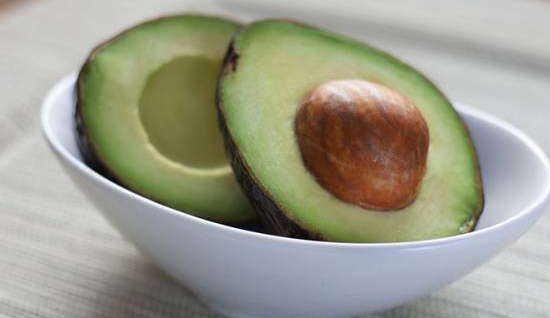
How to Increase Vitamin B5 Intake
The recommended daily intake of vitamin B5 is 5 mg for adults. Pregnant women need slightly more at 6 mg daily.
While deficiency is uncommon, you may benefit from more vitamin B5 if you:
Eat a poor or restricted diet
Have a medical condition that impacts absorption
Take certain medications like antibiotics or diuretics
Are a vegetarian or vegan
Drink excessive alcohol
Smoke cigarettes
Are under high stress
Are pregnant or breastfeeding
Here are some ways to safely increase your vitamin B5 consumption without supplements:
Eat 2-3 servings of B5-rich foods daily - Consume fatty fish, organ meats, mushrooms, nuts, seeds, eggs, dairy, beans, whole grains, broccoli, avocado.
Try pantothenic acid-boosted mushrooms - Certain mushrooms are grown in vitamin B5-enriched environments to increase their content.
Choose B5-fortified cereals and grains - Many breakfast cereals and whole grain products have pantothenic acid powder added. Check labels.
Pair foods together - Eat eggs with avocado, salmon over whole grain rice, or mushroom-bean tacos to combine B5 sources.
Don’t overcook vegetables - Cooking can deplete B vitamins, so steam lightly to retain nutrients.
If adjusting your diet is still inadequate, consult your physician about short-term vitamin B5 supplementation or a B-complex vitamin.
Signs and Symptoms of Vitamin B5 Deficiency
Because vitamin B5 is abundant in many foods, deficiency is extraordinarily rare in healthy individuals consuming a balanced diet. Symptoms of deficiency may include:
Fatigue, weakness, or exhaustion
Numbness or tingling in hands and feet
Muscle cramps or spasms
Nausea, abdominal pain, vomiting
Poor coordination, impaired movement
Headache, brain fog, memory loss
Low blood pressure
Irritability, mood changes, depression
Skin lesions or cracking
Impaired immune function
Severe deficiency over months or years can potentially lead to confusion, hallucinations, respiratory failure, anemia, and impaired growth in children.
Populations most at risk for deficiency include:
Alcoholics
Elderly with poor nutrient intake
Those with malabsorption disorders
Dialysis patients
Strict vegans or vegetarians
Pregnant women with extreme morning sickness
If you experience potential vitamin B5 deficiency symptoms, see your doctor to determine the cause and appropriate treatment. Blood tests can check levels.
What Can Destroy or Deplete Vitamin B5?
Because vitamin B5 is water-soluble, excess amounts are flushed from the body quickly through urine. Deficiency is more often caused by inadequate dietary intake rather than destroying stores. However, a few factors can deplete or interfere with B5 absorption or metabolism:
Medications
Certain prescription drugs like antibiotics, anticonvulsants, ulcer drugs, and steroids can deplete vitamin B5 levels over time. Oral contraceptives can also reduce absorption.
Alcohol Abuse
Chronic heavy alcohol use negatively affects the absorption of vitamin B5 and increases the risk of deficiency. This can contribute to some effects of alcoholism like impaired cognition, nerve damage, and anemia.
Inflammatory Bowel Diseases
Digestive disorders like Crohn’s disease or ulcerative colitis can impair the absorption of vitamin B5 and other nutrients from food. Malnutrition may result.
Dialysis
Individuals undergoing dialysis for kidney failure are at increased risk for B vitamin deficiencies, since these water-soluble vitamins can be removed by the purification process.
Pregnancy or Lactation
Increased pure vitamin b5 needs during pregnancy and breastfeeding mean deficiency is more likely if intake is inadequate. Supplementation may be recommended.
Excessive Heat
Cooking foods at very high temperatures for long periods can denature and destroy vitamin B5 and other B vitamins, reducing their levels.
With proper intake through varied whole foods and awareness of risk factors, acquiring enough vitamin B5 is readily achievable for most people. But consult your physician if you are concerned about deficiency.
The Bottom Line
B5 powder, also called pantothenic acid, is an essential B vitamin that aids energy production, hormone function, cholesterol synthesis, and more. Though deficiency is extremely rare, good food sources include organ meats, salmon, trout, mushrooms, avocado, broccoli, whole grains, eggs, and dairy.
Those at higher risk for deficiency can meet their daily vitamin B5 needs of 5-6 mg by consuming a balanced diet with diverse nutrients. Supplements may occasionally be warranted under medical supervision if deficiency occurs. Speak to your doctor to determine the best sources of vitamin B5 for your individual health needs.
References:
Institute of Medicine (US) Standing Committee on the Scientific Evaluation of Dietary Reference Intakes and its Panel on Folate, Other B Vitamins, and Choline. Dietary Reference Intakes for Thiamin, Riboflavin, Niacin, Vitamin B6, Folate, Vitamin B12, Pantothenic Acid, Biotin, and Choline. Washington (DC): National Academies Press (US); 1998.
Reynolds RD. Bioavailability of vitamin B-6 from fortified cereal-grain products and supplements in humans. American Journal of Clinical Nutrition. 1985 Aug;42(2):421-9.
Whitney EN, Rolfes SR. Understanding Nutrition. 10th ed. Belmont, CA: Thomson Wadsworth; 2005.
Leyva DR, Zaharia MD, Abrams SA. Vitamin and mineral supplements for children and adolescents. Pediatrics in Review. 2005 Dec;26(12):464-72.
Plesofsky-Vig N. Pantothenic acid. In: Shils M, Olson J, Shike M, Ross C, eds. Modern Nutrition in Health and Disease. 9th ed. Baltimore, MD: Williams & Wilkins; 1999:433-441.
McBurney MI, Thompson LU, Alhasan S, et al. Multivitamin-multimineral supplementation improved vitamin B9 and vitamin B12 status of young Mexican American women in the postpartum period. Nutrition Research. 2016 May;36(5):456-464.
Miller DK, Ouwehand AC, Keflie TS, et al. Effects on vitamin B12 biomarkers related to intake of different types of bovine milk, milk substitute and supplementation with cyanocobalamin, in Kenyan children: a randomised controlled trial. BMC Pediatr. 2019 Feb 8;19(1):48.
ABOUT AUTHOR

Celine Xu is a botanist with over 15 years of experience researching and developing plant extracts for nutritional and pharmaceutical applications. She leads an R&D team focused on identification, cultivation and extraction of medicinal plants. Celine Xu earned a Ph.D. in Plant Biology from UC Berkeley and has authored numerous articles in peer-reviewed journals about the health benefits of specific phytochemicals. She frequently speaks at industry conferences about new developments in plant extract research. Celine Xu is dedicated to advancing the scientific understanding of how targeted plant compounds can be used to improve human health.
Related Industry Knowledge
- What are the side effects and risks of acitretin?
- Does berberine reduce belly fat?
- Is quercetin the same as CoQ10?
- Do amino acids help burn fat?
- What Are Persimmons Good For?
- Does Polygala help sleep?
- What is DHM?
- Creatine HCL vs Monohydrate
- Puerarin Extract: Unlocking the Potential of Nature's Gift
- What Are The Benefits of Resveratrol?
